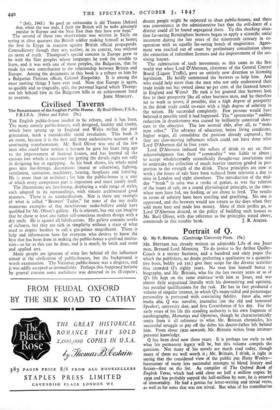Civilised Taverns
The Renaissance of the English Public House. By Basil Oliver, F.S.A., F.R.I.B.A. (Faber and Faber. 25s.)
THE English public-house needed to be reborn, and it has been. The many comely public-houses, well designed, healthy and roomy, which have sprung up in England and Wales within the past generation, mark a considerable social revolution. This book is an event, because it is the best and most authoritative account of a continuing transformation. Mr. Basil Oliver was one of the few men who could have written it because he gave his heart long ago to the improvement of licensed houses, and has learned all the curious lore which is necessary for getting the details right not only in designing but in equipping. As his book shows, his whole mind goes into bar-fittings, decorations (mural or otherwise), lighting, ventilation, sanitation, machinery, heating, fireplaces and lettering. He is more than an architect ; for him the public-house is a unit of which every component part is important and must justify itself.
The illustrations are fascinating, displaying a wide range of styles, each adapted to its surroundings, with sincere architectural good manners. There is no standardisation. Nor is there any example of what is called "Brewers' Tudor," for none of the not really numerous examples of that mischievous make-believe could have qualified for Mr. Oliver's gallery. He is tolerant, but one can imagine that he chose at least one rather self-conscious modern design with a dry smile. He is against all falsifications. His gallery contains works of richness, but they are rich in simplicity without a trace of what used to inspire boobies to call a gin-palace magnificent. There is help and information here for everyone who desires to know the best that has been done in making the public-house a civilised institu- tion—so far as this can be done, and it is much, by brick and stone and applied arts.
Many people are ignorant of what lies behind all the influences aimed at the civilisation of public-houses, but the background is worth examination. The Victorian public-house was a disgrace, and it was oddly accepted as irremediable. Perhaps this happened because by general consent some usefulness was detected in its ill-repute ;
decent people might be expected to shun public-houses, and there was convenience in the administrative fact that the evil-doers of a district could all be found segregated there. To this shocking situa- tion far-seeing Birmingham brewers began to apply a scientific social treatment during the last years of the nineteenth century in co- operation with an equally far-seeing bench of magistrates. Agree- ment was reached out of court by preliminary consultation about the extinction of redundant licences and the improvement of the sur- viving houses.
The culmination of . such movements as this came in the first world war when Lord D'Abernon, chairman of the Central Control Board (Liquor Traffic), gave an entirely new direction to licensing legislation. He boldly summoned the brewers to help him. And who could help more than the men who not only understood their trade inside out but owned about 90 per cent. of the licensed houses in England and Wales? He took it for granted that brewers look first to their prosperity like all other business men, and he therefore set to work to prove, if possible, that a high degree of prosperity in the drink trade could co-exist with a high degree of sobriety in the nation. He succeeded completely. Few persons would have believed it possible until it had happened. The " spectacular:" sudden reduction in drunkenness was caused by brilliantly contrived short- cuts to the objective. The law seemed able, after all, to "make men sober." The advance of education, better living conditions, higher wages, all consolidate the position already captured ; but they are slow-moving influences which could not have done what Lord D'Abernon did in four years.
Lord D'Abernon induced the sellers of drink to act on their acknowledgment that their " commodity " was liable to abuse ; to accept wholeheartedly scientifically thought-out restrictions and to undertake the collection of much heavier taxation graded in pro- portion to the strength of the drink. These principles are now at work ; the hours of sale have been reduced from nineteen a day to nine in London and eight elsewhere. The introduction of the mid- day " break " in sales was a stroke of genius, as was the relation of the hours of sale, on a sound physiological principle, to the times when men have fed, are feeding, or are about to feed. The results in terms of sobriety have been startling and gratifying. No one is oppressed, and the brewers would not return to the days when they sold more beer and made less money. Most of their profits go, as Lord D'Abernon desired, to the policy of building such houses as Mr. Basil Oliver, with due reference to the principles stated above,


































 Previous page
Previous page